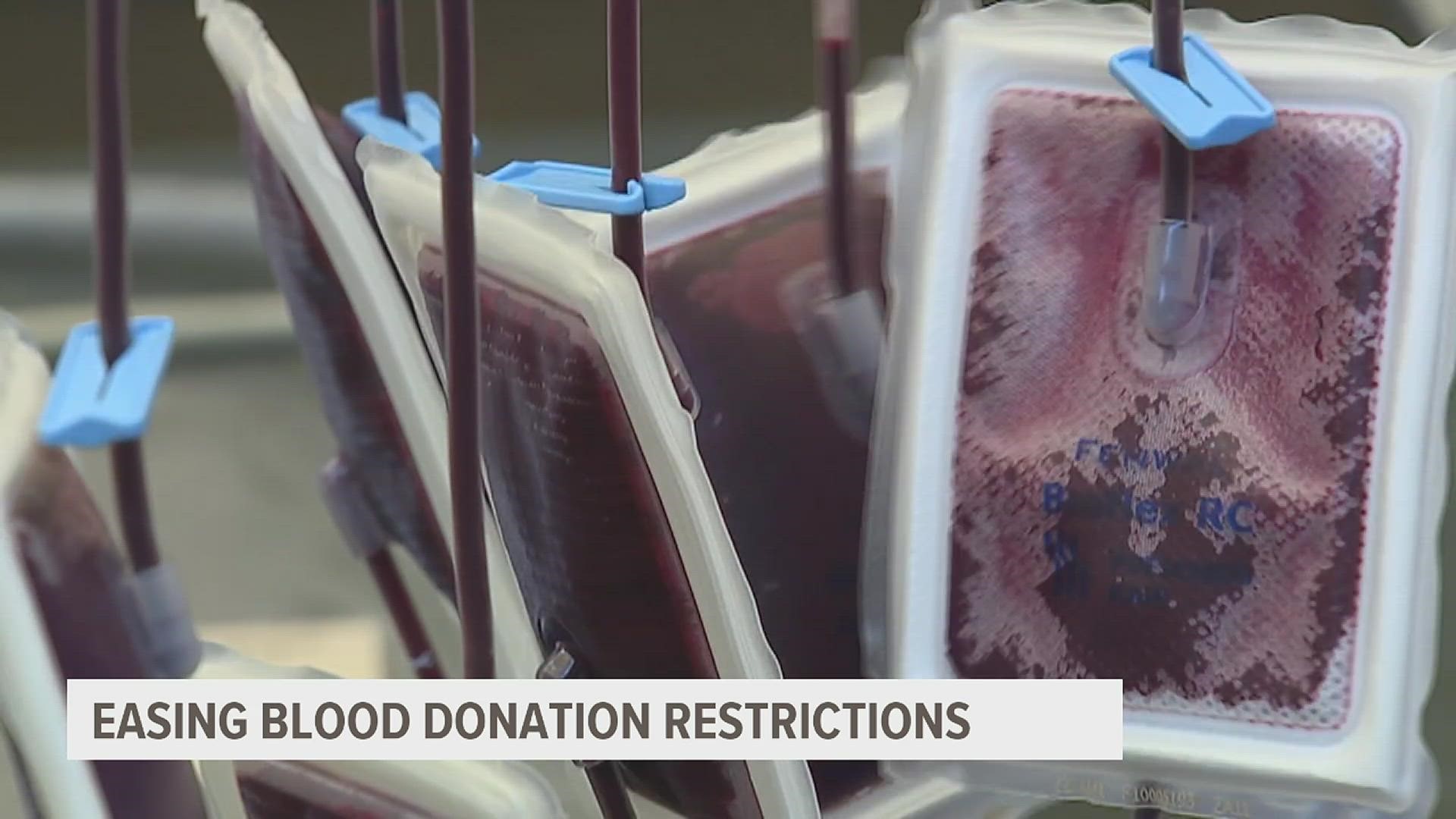DAVENPORT, Iowa — The U.S. Food and Drug Administration is moving to ease blood donation restrictions on gay and bisexual men.
The FDA announced the new draft guidance last Friday. It would eliminate the requirement that men who have sex with other men abstain from sex for three months before being eligible to donate blood. Instead, all donors would be screened with a questionnaire that evaluates their risk of contracting and transmitting HIV based on sexual behavior, partners and other factors.
The guidance also applies to women whose male sexual partners have sex with men.
However, non-monogamous men will still not be able to donate, even if they test negative for HIV, use condoms or take pre-exposure prophylaxis.
"A lot of time and effort has gone into identifying the safest protocols and an end to deferrals that are seen by many as discriminatory," said Amanda Hess, the VP of donor relations and marketing at ImpactLife. "It's important that we as an industry show that we look at data and that we use research to make decisions about blood safety and about donor safety. And this is another example of that. Anytime we can expand the donor pool, it is a good thing because, potentially, there may be more donors willing to give. We just don't know what the results of this change might be."
Adam Peters, the director of operations at Clock Inc., the LGBT+ Community Center in Rock Island, called the change "long overdue."
"The FDA is focusing on sexual behaviors instead of gender and sexual identities, which is huge," Peters said. "Forever, it's been kind of stigmatized. And that was born out of just miseducation out of the HIV AIDS epidemic of the 80s... This is long overdue, and it kind of kills the stigma."
The U.S. issued a lifetime ban on blood donations from gay and bisexual men during the 1980s AIDS epidemic to prevent the spread of HIV through the blood supply. That lifetime ban was lifted in 2015 and replaced with a one-year abstinence requirement, and in 2020, due to the blood donation shortage during the COVID-19 pandemic, the FDA shortened it to the current three-month abstinence period.
"In the 80s, they did not have the testing methods and protocols that we have today," Hess said. "Our testing is better than it's ever been for infectious diseases like HIV and Hepatitis C, and using evidence-based research is going to help us modify our protocols and bring it to the present so that it's appropriate and as inclusive as possible, while still being as safe as possible."
The policy change mirrors policies already in place in Canada and the U.K.
Peters said Clock Inc. wants to work with blood donation centers to hold its own blood drive once the guidance takes effect.
"Because the ban was in place for so long, I mean, it will take a long time for people to get the education, get the information necessary, but we're excited here at Clock Inc. to be a part of that change," Peters said. "I've never donated blood before, so I can't wait to finally give blood. And I'm not less than. I'm equal to everyone else giving blood."
The hope is to help address the nationwide blood shortage, although Hess isn't sure that will be the case.
"The reality is right now less than 5% of the population donates blood, but 60% are currently eligible to give, so we already have a situation where people are not giving blood," she said. "So we hope that people will consider donating. We don't know what this change will do, but we think it was the right change to make."
The FDA's draft guidance proposal will be open to public comment for 60 days. After, they FDA will review the comments before finalizing its draft guidance. There's no timeline for when that finalization will happen.
Once it is finalized, Hess said it will take several months for ImpactLife to make the changes, which includes new questionnaires, training for staff and updating computer software.
More information on the draft guidance can be found here, along with a link to submit comments.
Watch more news, weather and sports on News 8's YouTube channel

